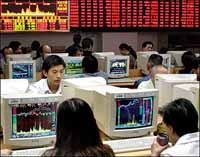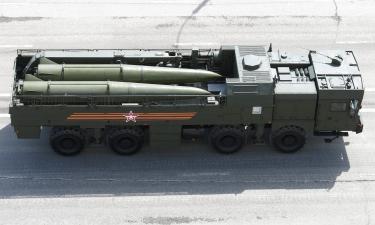Asian, European markets drop for 2nd day amid global jitters, but Chinese stocks recover
Chinese stocks bounced back Wednesday after their biggest decline in a decade, but stock markets in Asia and Europe fell for a second day amid investor jitters about possible slowdowns in the Chinese and U.S. economies.

Shares in Japan, South Korea, Singapore, Malaysia, India, Australia and the Philippines all tumbled more than 2 percent after Wall Street suffered its worst day since the Sept. 11, 2001, terrorist attacks.
But as the day progressed, several Asian markets trimmed big early losses, and analysts said the sell-off was most likely a temporary correction to cool overheating markets, although they warned that markets would likely remain volatile for awhile.
"We don't need to worry about a big reduction from here, but this correction could continue for the next couple months," said Shinichi Ichikawa, an equity strategist with Credit Suisse in Tokyo.
Japan's Nikkei 225 stock index tumbled 2.85 percent to 17,604.12, while Philippine stocks plunged 7.9 percent, their worst drop since 1997, at the height of the Asian financial crisis.
Some investors used the drop as an opportunity to go bargain-hunting. Malaysian stocks, after falling as much as 8.2 percent, closed down 3.3 percent. Australian stocks closed down 2.7 percent after falling as much as 3.5 percent.
In Europe, Britain's benchmark FTSE 100 Index was down 0.9 percent in midday trading, while France's CAC 40 Index was down about 1 percent after opening down more than 2 percent. In Frankfurt, the DAX index was down 0.9 percent to 6,758.17.
Meanwhile, China's Shanghai Composite Index bounced back 3.9 percent to close at 2,881.07, rebounding from its 8.8 percent plunge Tuesday its biggest drop in a decade which triggered the global sell-off.
Bullish comments in China's state-controlled media appeared to reassure anxious domestic investors, who account for virtually all trading.
China will focus on ensuring financial stability and security, the official Xinhua News Agency cited Premier Wen Jiabao as saying in an essay due to be published in Thursday's issue of the Communist Party magazine Qiushi.
Authorities also denied rumors of a 20 percent capital gains tax on stock investments speculation that had played a role in Tuesday's plunge.
Many Asian markets were due for a correction after their recent spectacular performance, analysts said.
Benchmark indexes in China, Australia and Singapore had all hit records in February. Before this week's plunge, Malaysian stocks had gained 17 percent this year, while Philippine shares had climbed about 12 percent.
Wednesday's sell-off was a limited, knee-jerk response, said Kiichi Fujita, an equity strategist with Nomura Securities in Tokyo. "It's a bit of an overreaction," he said.
Other equity analysts said the market's volatility could trigger more selloffs, despite sound economic data.
"A lot of that exuberance about just buying anything at all cost just starts to evaporate if the market has big falls like this," said David Halliday, associate director at Macquarie Equities. "I think the important thing to note is that this hasn't been triggered by an economic, financial or political crisis."
Japan's Chief Cabinet Secretary Yasuhisa Shiozaki echoed that sentiment, trying to quell concerns about the Tokyo market by stressing that overall fundamentals in Japan were still strong.
"On a broad perspective the corporate sector continues to perform well," Shiozaki said. "A long-term economic recovery is continuing."
On Wednesday, Australian Treasurer Peter Costello predicted the plunge in China's share market would trigger "volatility on equity markets for some time."
But his overall assessment of China's economy was positive, telling reporters the Asian giant would continue to grow, albeit "in fits and starts."
Some regional brokers said they saw an element of panic selling among retail investors but that more experienced investors were sitting it out. Other market players were on the look out for bargain hunters to emerge, reports AP.
"If your target is gains by the end of 2007, this is a good chance to buy," said Credit Suisse's Ichikawa. "But if it's the end of March, I can't say that."
Subscribe to Pravda.Ru Telegram channel, Facebook, RSS!


